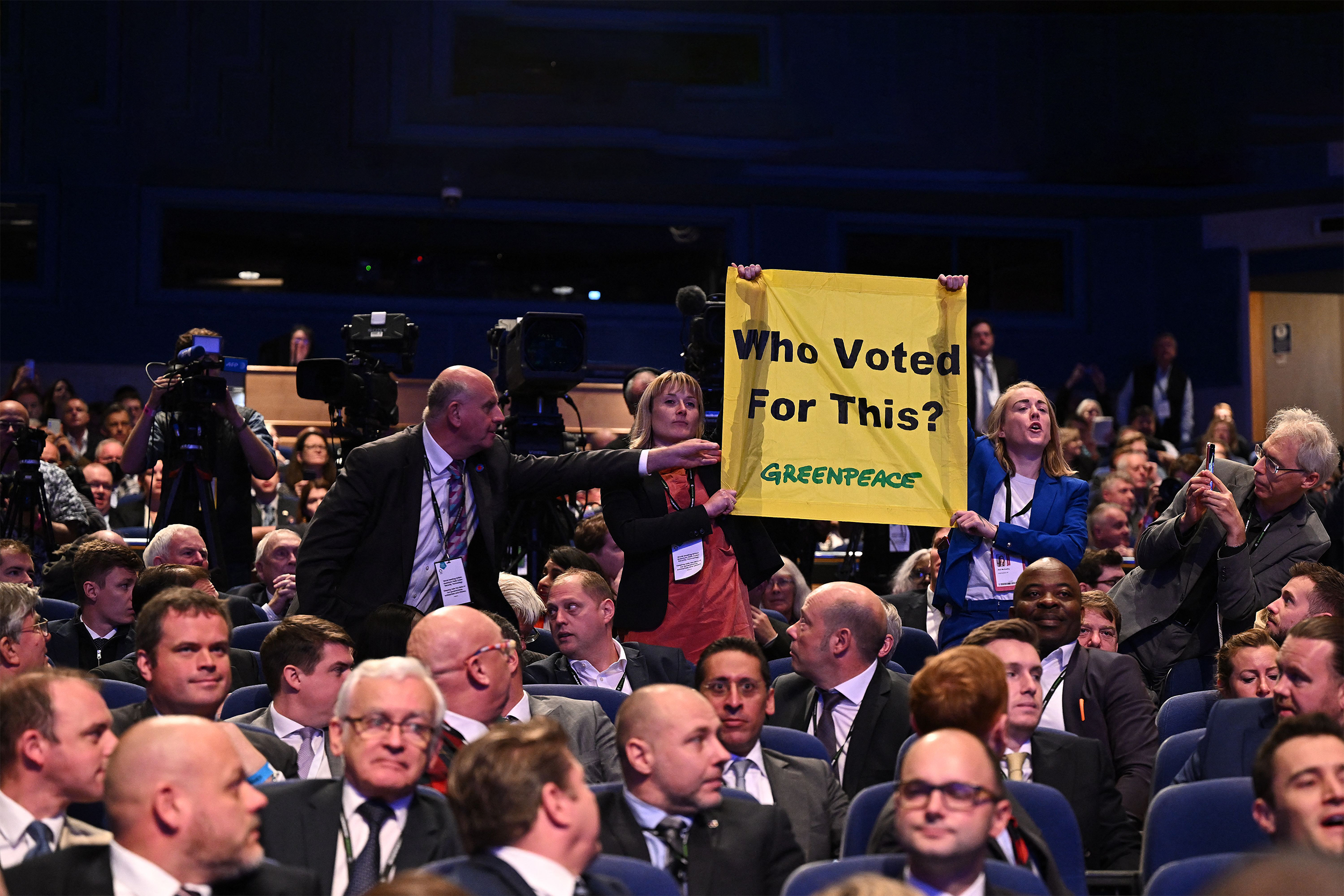Greenpeace campaigners interrupted Liz Truss’s televised speech at the Conservative Party conference to denounce the prime minister “shredding” her party’s election manifesto.
Greenpeace UK’s head of public affairs Rebecca Newsom and policy officer Ami McCarthy stood facing the prime minister close to the front rows of the hall where cabinet members were seated, holding up a banner asking: “Who voted for this?”.
BREAKING 🚨
Greenpeace activists have interrupted @TrussLiz speech at #CPC22 to denounce the prime minister 'shredding' her party’s 2019 manifesto promises.The PM is U-turning on fracking, strong climate action, and world-leading environmental protections.
Who voted for this? pic.twitter.com/f2SSn7hBu3
— Greenpeace UK (@GreenpeaceUK) October 5, 2022
Broken promises
A Greenpeace UK analysis has identified at least seven areas across environmental protection, climate action, workers’ rights and tackling inequality where policies either confirmed or being considered by Truss and her ministers are at odds with the 2019 Conservative manifesto. They include high-profile pledges to have the “most ambitious environmental programme of any country on earth”, confirm a moratorium on fracking, “raise standards in areas like workers’ rights, animal welfare, agriculture and the environment”, reform farming subsidies so that landowners “farm in a way that protects and enhances our natural environment”, and “continue our efforts through the tax and benefits system to reduce poverty”.
The government has instead lifted the moratorium on fracking; set in train the potential abolition of hundreds of EU laws protecting wild places and regulating water quality, pollution and the use of pesticides; dismissed environmental protections as ‘burdens’ in the Chancellor’s Growth Plan; signalled a potential roll-back of new nature-friendly subsidies for farmers; and is considering not increasing Universal Credit in line with inflation.
"Nobody voted for fracking, nobody voted to cut benefits, nobody voted to trash nature, nobody voted to scrap workers' rights."
"There's a whole host of things that the @Conservatives were elected to do in 2019, that they are simply not doing."#WhoVotedForThis #CPC22 pic.twitter.com/W6nB26ZYjv
— Greenpeace UK (@GreenpeaceUK) October 5, 2022
The public wants stronger green policies
According to a recent YouGov survey, 81 per cent of UK adults believe nature is under threat and that more needs to be done urgently to protect and restore it. Recent Ipsos research found that “growth is not supported at any cost, especially if it is at the cost of countryside and environment,” and polling from Unchecked found that deregulation is unpopular and a vote loser.
More than 100 leading businesses have written to the prime minister urging her to stick to the UK’s climate commitments for the good of the economy. Former Conservative leader William Hague has urged Truss to rethink her attack on nature, while former environment secretaries George Eustice and Michael Gove have called on their successor, Ranil Jayawardena, not to ditch a landmark reform of farming subsidies. Meanwhile, US President Biden said that he is “sick and tired of trickle-down economics” and that “it has never worked”, just days before the Chancellor Kwasi Kwarteng announced enormous unfunded tax cuts that will disproportionately benefit the rich.




